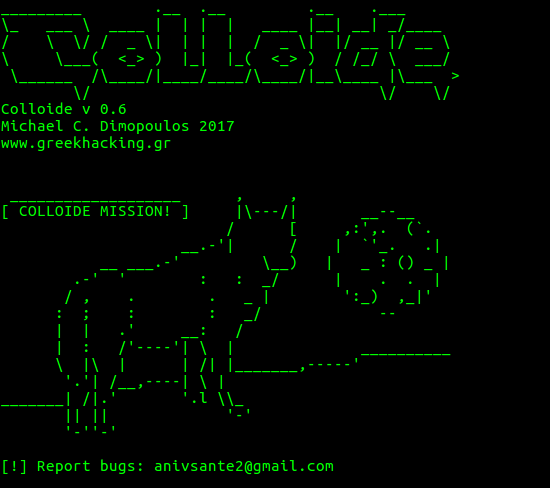
概述
在渗透测试的时候我们通常要找一个网站的后台,但是有时候网站的后台并不是特别好找,比如我们学校的那个垃圾网站,今天用到的工具叫colloide,它是一款利用字典扫描后台的工具
使用
首先clone下来
git clone https://github.com/MichaelDim02/colloide.git
root@kali:~/colloide# ls
LICENSE README colloide.py links.txt
里面有上面四个文件当然主要的文件就是colloide.py,links.txt就是字典文件
运行一下
root@kali:~/colloide# python colloide.py
_________ .__ .__ .__ .___
\_ ___ \ ____ | | | | ____ |__| __| _/____
/ \ \/ / _ \| | | | / _ \| |/ __ |/ __ \
\ \___( <_> ) |_| |_( <_> ) / /_/ \ ___/
\______ /\____/|____/____/\____/|__\____ |\___ >
\/ \/ \/
Colloide v 0.6
Michael C. Dimopoulos 2017
www.greekhacking.gr
-h --help Display the help panel (Shown right now)
-u --URL The URL to the website
-p --pages Path to the wordlist with the page names / links
-l --legals License & legal disclaimer
-s --save Save pages on a text file (name of the file)
-L --limit Add limit to the pages (Integer)
Usage: python colloide.py -u [URL] -p [WORDLIST] -s [TEXT FILE] -L [NUMBER]
-u用来指定扫描地址,-p指定字典,其他的看上面
最常用的就是下面这样
python colloide.py -u www.example.com -p links.txt
其实说实在的这个脚本不是特别好
看它里面的这段代码
try:
response = urlopen(req)
except HTTPError as e:
continue
except URLError as e:
continue
else: #prints working link
print("[+] Link Found -> " + req_link)
found = found + 1
if txt:
f = open(str(tfilename) ,'a')
f.write(req_link + "\n")
else:
pass
因为如果我只要在服务器端设置一个404页面,让每一个你扫描到的页面都不会报出httperror就可以了,这样你的每一个字典中的链接都是可以找到的,所以这个脚本就没什么用了
欢迎关注我的博客www.bboy.app
Have Fun
